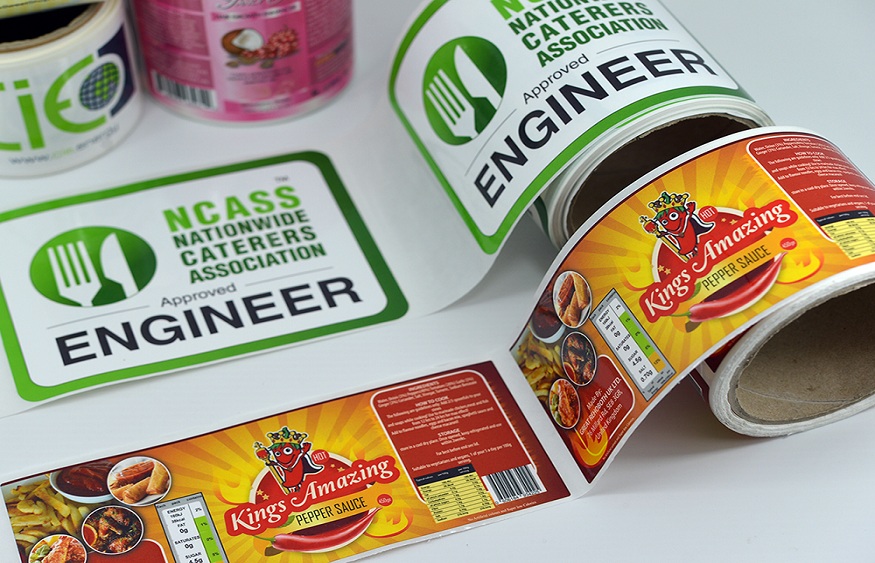The food packaging labels have tremendous significance since they provide key information about food items that is vital to consumers. Labels inform consumers about ingredients, nutritional information, storage instructions, and warnings. The use of custom food labels is an important aspect of brand differentiation in the competitive food market today. Here are some of the key reasons why food brands should consider using custom labels for their products:
Conveying Your Brand Identity
One of the major advantages of custom food labeling is that it helps to strengthen and reinforce your brand identity. By using a custom design, it is possible to include your brand name, logo, slogans, relevant colors, and other elements that are known to your ideal market. It gives you instant recognition by the customers, separates you from the competition, and helps create brand awareness.
Highlighting Product Features
Along with brand building, you will also have more space to highlight the distinctive features and benefits of your product. You may focus on ingredients, health benefits, and culinary uses through descriptive text, appetizing photography, illustrations, or graphics.
Tailoring content to your audience
You can tailor-make the labels and enhance brand value by optimizing them on a more appealing basis with respect to targeted consumer categories. Millennials, health-conscious shoppers, time-poor families, and so forth require different graphics, wording, and messaging.
Customization allows you to call out gluten-free, vegan, non-GMO, or other attributes that matter to your audience. You can also tailor serving suggestions and recipe ideas specifically for them. Speaking directly to your target shoppers in this way helps you connect.
Meeting labeling requirements
In addition to marketing advantages, custom labels give you more flexibility in meeting food labeling regulations. Rules regarding nutrition facts, ingredient lists, allergen information, and other mandatory statements differ across global markets. With custom production, you can adjust label content and layouts to stay compliant in multiple countries.
This also includes accommodating different language requirements. You can print multi-language labels suited for exporting abroad or serving immigrant communities at home. Staying compliant in this way broadens your market reach.
Reflecting Your Package Design
As packaging aesthetics evolve, custom labels allow you to match the look and feel of new containers and surfaces. For example, you can mimic artisan paper textures or metallic treatments used on glass or plastic containers with complementary label designs.
Aligning the labeling with the overall package design creates a unified, premium appearance. This helps your product stand out through its excellent shelf presence. Consistent packaging aesthetics also reinforce brand identity and image.
Indicating Limited Editions
For specialty and seasonal products, custom labels lend themselves well to reflecting limited-edition runs. You can denote unique holiday offerings, local ingredients, or small batch production numbers in the label copy and visuals.
This labels these specialty offerings distinctly from the core product lines. It also adds collectability and gift potential for consumers seeking unique products. Limited edition details make products more exciting and memorable.
Calling Out Certifications
Custom labels provide a timely way to proclaim any special certifications your brand has secured. If your product is USDA Organic, Fair Trade, Non-GMO Project Verified, or has other designations, you can boldly announce it. This visibility helps position products as meeting trusted standards that appeal to many consumers.
Prominent certifications on labeling can also help justify premium pricing. They assure shoppers that a product is held to higher standards to merit the increased cost.
Improving identification and inventory
For warehouses, retailers, and other points in the supply chain, custom elements like barcodes, batch numbers, and QR codes on labels can improve product identification and inventory management. This allows brands better traceability and retailers more accuracy in stocking the right products in the proper rotation.
Supply chain partners can also use smart labeling to confirm the authenticity of products and prevent counterfeiting issues. Custom labels give brands more control over these useful identifiers.
Conveying Quality and Safety
Custom labels present more ways to convey quality and reassure consumers that foods are safe for consumption. Fine details like embossed textures, foil stamping, and rounded label edges signal high-end products. Safety seals also assure tamper-free packaging.
Brands can also explain special safety steps like high-pressure processing, precision fermentation, or gentle handling procedures to highlight safety. The right labeling cues elevate perceptions of quality and care.
Reflecting Your Values
Today’s consumers want transparency about how their food is produced and assurance that it aligns with their values. Custom labels allow brands to share details like locally sourced ingredients, sustainable materials, ethical business practices, and positive social impact.
Telling these stories creates meaningful connections with shoppers. It also builds consumer loyalty, trust, and the willingness to pay more for purpose-driven brands they believe in.
Creating Shelf Appeal
In conclusion, well-thought-out custom labels always lead to attractive products in store displays. It is also about the right shape of the label, suitable for the material, message, and graphics, enticing shoppers to pick things up, explore, and learn more. Shelf appeal may be created by having a stylish label, a tempting food shot, a funny message, or various other design elements.
This helps to improve the shelf presence of products and increase sales. The label is the first visual contact with the product and must grab attention. You can give anything maximum attractiveness through custom design.
Conclusion
The benefits of custom food labels include improved branding, highlighting key attributes, enhanced customer appeal, and adherence to changing consumer trends. Food brands can easily resonate with their consumers on a much deeper level by taking advantage of custom labeling.
Custom food labels are an effective investment with so many benefits that go beyond simple labeling requirements. The cosmetic labels company create memorable experiences that lead to branded perspectives for products. These personal touches may be what it takes in a competitive marketplace to get customers to buy a product and remember the company. Brands therefore have excellent chances to be noticeable, relate to consumers, and enjoy success through the use of custom food labels.



